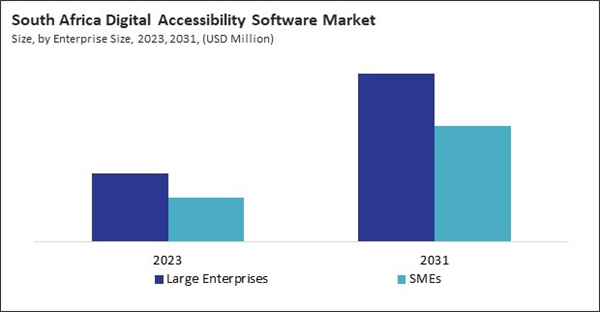The Brazil market dominated the LAMEA Digital Accessibility Software Market by Country in 2023, and is expected to continue to be a dominant market till 2031; thereby, achieving a market value of USD26.1 Million by 2031. The Argentina market is capturing a CAGR of 12.5% during 2024-2031. Additionally, the UAE market would register a CAGR of 10.7% during 2024-2031.
Despite the market’s growth, the digital accessibility software sector faces several challenges. One of the most significant hurdles is the lack of skilled professionals with expertise in accessibility standards and software development. Implementing accessibility solutions requires specialized technical development knowledge and the legal and ethical frameworks governing accessibility standards.
However, there is currently a shortage of professionals with this dual expertise, which has slowed the market’s growth. Another challenge is the perception of low return on investment (ROI). Some organizations view digital accessibility as an additional cost or regulatory burden rather than an opportunity for business growth. They may not immediately recognize the long-term benefits of creating inclusive digital environments, such as expanding their customer base and enhancing brand reputation.
South Africa, one of Africa's most prominent emerging markets, is witnessing increased demand for digital accessibility software. The country is home to a rapidly growing digital economy, with sectors like fintech, e-commerce, and online education seeing significant growth. According to Statistics South Africa, approximately 79% of the population uses the internet. This surge in online activity, particularly among young and urban populations, is driving businesses to focus on creating inclusive digital experiences.
While South Africa has not yet implemented comprehensive digital accessibility laws, businesses are increasingly adopting accessibility software to ensure their platforms cater to a diverse user base and position themselves competitively in a fast-growing market. Therefore, as more people in the region gain access to online services, businesses and governments are adopting digital accessibility solutions to meet the needs of their populations, support economic growth, and ensure inclusivity in the digital age.
List of Key Companies Profiled
- accessiBe Inc.
- org INC.
- AudioEye, Inc.
- Axess Lab
- Deque Systems, Inc.
- Evinced Inc.
- Level Access Inc.
- Silktide Ltd
- Siteimprove A/S (Nordic Capital Limited)
- UsableNet Inc.
Market Report Segmentation
By Offering
- Website Accessibility Software
- Color Contrast Checker Software
By Enterprise Size
- Large Enterprises
- SMEs
By Country
- Brazil
- Argentina
- UAE
- Saudi Arabia
- South Africa
- Nigeria
- Rest of LAMEA
Table of Contents
Companies Mentioned
Some of the key companies in the LAMEA Digital Accessibility Software Market include:- accessiBe Inc.
- AccessibilityChecker.org INC.
- AudioEye, Inc.
- Axess Lab
- Deque Systems, Inc.
- Evinced Inc.
- Level Access Inc.
- Silktide Ltd
- Siteimprove A/S (Nordic Capital Limited)
- UsableNet Inc.









